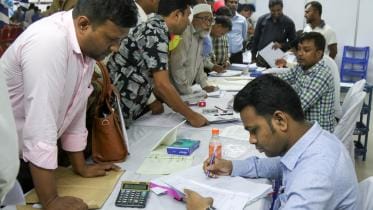Minimise tax evasion and combat graft
There is no denying the fact that Bangladesh’s economy has grown at a steady and relatively fast pace since the early 1990s.
23 March 2025, 18:00 PM
Accelerating revenue collection by NBR
There is no denying that Bangladesh’s economy has grown at a fast and more or less constant rate since the early 90s. Similarly, our dependence on foreign loans and grants for development budget had also reduced after, among others, the introduction of VAT.
24 November 2024, 18:00 PM
Personal guarantee against corporate lending: how effective is it?
Providing securities and guarantees is very common in corporate lending. Securities are immovable and moveable tangible assets and might be in the forms of pledge, hypothecation or in any other form.
25 September 2024, 18:00 PM
Siphoning public money and its fate
In recent years, Bangladesh’s position in the global corruption index has been a major concern. Under the previous regime, the situation deteriorated, especially as people in power and their families became more deeply involved in corruption. While corruption exists in most countries, the question is its magnitude. If it goes beyond a tolerable level, it can severely affect the economy and its growth. There is a general perception that a 10 percent reduction in corruption can positively impact GDP growth by 1 percent, although this relationship varies by country and requires further research.
18 September 2024, 18:00 PM
More effective steps needed to widen tax net
With 53 years having passed since Bangladesh gained independence, it is now considered as one of the next emerging economies in Asia and has the prospect of being ranked among middle-income countries.
20 August 2024, 18:00 PM
Large Taxpayers Unit deviating from basic principles
The idea of establishing a Large Taxpayers Unit (LTU) in Bangladesh originated from the government’s desire to introduce modern methods of tax administration, although in a limited scale. It started functioning in 2003.
8 May 2019, 18:00 PM
Expansion of tax net should be a top priority
Bangladesh has an estimated population of more than 16 crore, but the number of registered taxpayers (e-TIN holders) is roughly 38
6 May 2019, 18:00 PM










